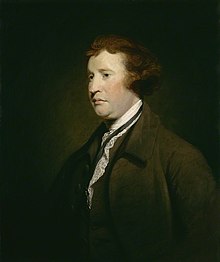Riskin’s started with the way Edmund Burke (1729–1797) defined conservative politics in the 1790s.
Burke had been an ally of the American Whigs. In 1765 he was private secretary to the Marquess of Rockingham, who led one opposition Whig faction in Parliament. Toward the end of that year, the marquess became prime minister. His team found a pocket borough to send Burke to Parliament, where his oratory made a quick impression.
Rockingham was soon out of power, but Burke continued to be his faction’s most eloquent voice, in both speeches and print. In 1774 he won a seat from Bristol and promptly told his constituents that he would vote as he saw best, not as they told him; he didn’t win reelection from that district six years later.
When Rockingham returned to power after the British defeat at Yorktown, he made Burke Paymaster of the Forces. Rather than maintain the job as a lucrative sinecure, Burke introduced a law to reduce its financial latitude. He wrote other reform bills as well, though some stuck only after other people introduced them.
After Rockingham died, Burke allied with Charles James Fox. That worked out during the brief Fox-North coalition government, but then William Pitt the Younger became prime minister and stayed in the job for the rest of the century. Because of faction rather than strong ideological reasons, Burke was stuck in the opposition during his final years.
Those were also the years of the French Revolution, which inspired Burke’s statements on conservatism. In her op-ed, Prof. Riskin drew a hard line between that ideology and the political methods of Donald Trump and his followers:
Each time a commentator refers to Trumpism as “conservative” — probably hundreds of times a day — Edmund Burke surely rolls over in his discreetly marked grave in Buckinghamshire.Note that Riskin wrote thirteen months ago, before 6 Jan 2021.
Burke, the Irish political philosopher and Whig MP who originated Anglo–American conservatism, supported the rebellion of the British colonies in North America but hated the revolutionaries in France, and there you have conservatism in a nutshell. The American rebellion, Burke judged, was not a revolution but a movement to conserve an ancient principle of the British constitution, the people’s power of “granting their own money” to the government. Also in keeping with Burke’s “principle of conservation” was the colonists’ preservation of other longstanding institutions such as slavery, which Burke favored eliminating, but only “gradually.”
In France, on the other hand, people went rushing around hurling kings from their thrones, abolishing feudalism, summarily eliminating aristocratic and clerical exemptions and privileges, and making a lot of vulgar noise about equality. That sort of revolution was anathema to Burke. The discreet marker on his grave was a compromise: he had asked that it be altogether unmarked, sure that the Jacobins would arrive in droves to desecrate his final resting place, if they could find it, as they had desecrated the institutions of the Old Regime.
His abhorrence of the French Revolution led Burke to define the political philosophy that would come to be known as conservatism. His central principle was that abstract political ideals, such as the ideal of absolute equality, were dangerous because they led people to destroy longstanding traditions in their name. A society could not rest upon airy abstractions, Burke argued, but only upon solid things: traditional institutions, such as the institutions of property and inheritance. Burke’s “principle of conservation” held that any reform must be undertaken gradually, keeping always in mind that traditions were the bedrock of society, and that to eliminate them was to invite mayhem. . . .
“Conservative” in reference to Trumpism is dangerously misleading. If you’re a conservative, you’ll think the word denotes wisdom and judiciousness, two things Trumpians don’t even pretend to embrace, but make a show of flouting. If you disagree with conservatism as a political philosophy, you might think it sounds stodgy, benighted, even oppressive, but in a static or at least a slow-moving way, not in a way that poses an immediate threat of civil war. No one associates an attempted coup, even an inept one such as we’ve been witnessing, with the word “conservative.”
On that day Trump told thousands of followers, “we’re going to walk down, and I’ll be there with you,…we’re going to walk down Pennsylvania Avenue. . . . And we’re going to the Capitol.” And then he went home to watch the resulting violence on television. That habitual deceit isn’t even “Trumpism”; it was just trumpery.

Typical of today's Democrats, Riskin, and you, are projecting again.
ReplyDeleteThanks for the laugh. Responding to an essay grounded in historical and current fact with an unsupported accusation of projecting is excellent parody of what claims to be American conservatism today.
ReplyDelete